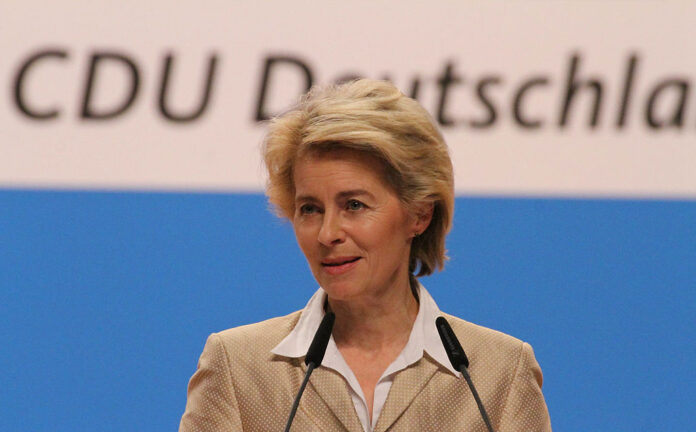Commission President Ursula von der Leyen outlines plans for increased climate investments, though environmental groups remain sceptical
On July 18, 2024, Ursula von der Leyen was re-elected as president of the European Commission, bringing a renewed commitment to climate action. Amid concerns over tightened budgets, increased defence spending, and a rise in far-right MEPs, von der Leyen’s reaffirmation of the Green Deal was a significant relief for the cleantech industry.
In her speech before the European Parliament in Strasbourg, von der Leyen laid out her vision for the next phase of the Green Deal, emphasizing implementation and investment. She promised that her administration would be an “investment Commission,” focusing on green investments. Central to her strategy is the introduction of a Clean Industrial Deal within the first 100 days of her mandate. This deal aims to boost investment in clean energy infrastructure and technologies, simplify processes for businesses, and introduce an Industrial Decarbonisation Accelerator Act to aid energy-intensive sectors in transitioning to greener practices.
Embed from Getty ImagesVon der Leyen also proposed the creation of a European Competitiveness Fund to invest in strategic technologies, including clean tech. She highlighted the need to address barriers within the Single Market to retain innovative start-ups in Europe and promised increased spending on research and innovation.
While the proposals are promising, many details, including specific financial commitments, remain unclear. Von der Leyen mentioned plans to propose a reinforced long-term EU budget from 2028 but acknowledged that negotiations with member states will be challenging and alternative funding sources will be necessary in the meantime.
Industry lobby groups expressed optimism about the Commission president’s agenda. Hydrogen Europe praised the high climate ambitions and the framework for EU net-zero industrial investments. Walburga Hemetsberger, CEO of SolarPower Europe, commended the new EU Clean Industrial Deal, reflecting support from a broad coalition of over 550 signatories.
However, environmental groups like Transport & Environment (T&E) voiced concerns. T&E welcomed the commitment to enshrine the 90% emissions reduction target for 2040 in EU law but criticized von der Leyen’s plan to amend the 2035 ban on CO2-emitting cars to allow e-fuels. Julia Poliscanova, senior director at T&E, argued that focusing on niche e-fuels would detract from the larger goal of securing clean and competitive EV supply chains.
The Paris-based Institute for Climate Economics supported von der Leyen’s approach to investing in a green industrial base, suggesting that existing instruments like the Innovation Fund and support from the European Investment Bank could be leveraged more effectively. However, the institute warned that closing the investment gap would be a major challenge, with annual investments needing to double to meet Europe’s 2030 climate goals.
Environmental advocates expressed relief that the EU’s climate targets remain intact but feared that a focus on competitiveness might overshadow meaningful climate action. Greenpeace’s EU director, Jorgo Riss, criticized the agenda for lacking concrete measures and new initiatives, accusing it of being overly influenced by big business interests. Chiara Martinelli, director at Climate Action Network Europe, emphasized that support for private companies should be contingent on social and green commitments, advocating for an industrial deal that promotes circular consumption, renewable energy, and excludes fossil fuels.
Besides clean tech, the proposed EU Competitiveness Fund would also support strategic sectors such as biotech, artificial intelligence, and space. Claire Skentelbery, director of industry association EuropaBio, welcomed the focus on biotech, highlighting the EU’s existing strengths in this field and the potential for further progress towards competitiveness and resilience.
Analysis:
Political Perspective: Von der Leyen’s re-election and her commitment to the Green Deal signal a strong political stance on climate action, reinforcing the EU’s leadership in global environmental policy. Her plans aim to balance the political landscape by addressing both climate and economic concerns, potentially garnering support from a wide range of MEPs, including those who prioritize economic growth and innovation. However, the rise of far-right MEPs and their focus on defence spending and budget cuts could pose significant challenges to securing the necessary funding and political backing for these initiatives.
Social Perspective: The emphasis on green investments and clean energy infrastructure reflects a growing societal demand for sustainable development. By focusing on implementation and investment, von der Leyen’s plans could create new job opportunities in the clean tech sector, contributing to economic growth and social stability. However, the success of these initiatives will depend on effectively addressing social equity concerns, and ensuring that the benefits of green investments are distributed fairly across different regions and communities within the EU.
Racial Perspective: The proposed green investments and clean industrial policies must consider the diverse populations within the EU, ensuring that marginalized communities are not left behind. Policies should aim to provide equal access to new job opportunities and support for small and medium-sized enterprises (SMEs) owned by minority groups. Inclusive policy design and implementation are crucial for achieving a just transition to a greener economy, preventing racial disparities in the distribution of economic benefits and environmental improvements.
Gender Perspective: Von der Leyen’s plans could significantly impact gender dynamics within the EU, particularly by promoting gender equality in the clean tech industry. Ensuring that women have equal access to education, training, and employment opportunities in the green economy is essential for achieving broader social and economic goals. Policies should address barriers to women’s participation in STEM fields and support initiatives that encourage female entrepreneurship and leadership in clean tech and sustainable development sectors.
Economic Perspective: The focus on green investments and clean energy infrastructure is expected to stimulate economic growth and innovation within the EU. By supporting strategic technologies and addressing barriers to the Single Market, von der Leyen’s plans aim to enhance the EU’s competitiveness on the global stage. However, securing the necessary funding and managing the transition to a green economy will require careful economic planning and coordination with member states. The proposed European Competitiveness Fund and other financial instruments will play a crucial role in mobilizing resources and attracting private investments.
